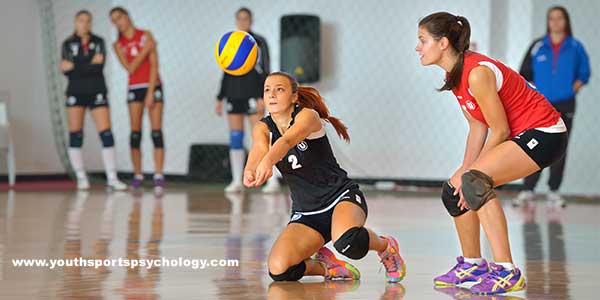
How to Help your Athlete have Self-Confidence
A volleyball player wrote us recently:
“Volleyball just started up again a few weeks ago and I was very excited. My coach told me I would probably play varsity by our first game, I got to go with to tournaments and team camps and I played a lot! But at the team camp my confidence and ability went down. The team of older girls got mad at me and talked bad about me behind my back and made me feel really icky.”
This player told us that later, the coach said she wouldn’t be needed until middle of the season. “That really stung as well. All I thought about was ‘I’m doing bad and every bad hit I have, my coach sees and I’m losing my varsity spot.” It would replay in my head over and over…
“I felt like I was giving up this huge opportunity. At this point I wanted to quit and move schools. I was playing so badly it really affected me. I make one bad hit and I overthink it too much and feel down. We have a week break of no volleyball, how can I fix my confidence before then?”
This young athlete is allowing other people to bust her confidence. As sports parents, it’s important for you to encourage kids to have stable self-confidence when adversity hits. You want them to focus on SELF-confidence, rather than allowing others to affect their confidence.
If your sports kids say that other players are talking behind their backs or hurting their feelings, remind your kids that they can’t allow others to drag them down. Note: In many cases, athletes will think others are saying things, but in reality they are making unfounded assumptions.
For many reasons, other kids may talk negatively about your athletes, and in this case, a likely reason is jealousy because this player is younger than the others.
If other kids are jealous, players can’t let it affect their game or confidence. They need to focus on what they can control–their thoughts, their focus and the passes, serves, digs, or hits they need to execute to get the job done.
Encourage kids to ban negativity from their thoughts and focus on what’s happening right now…
Remind them to think about what they bring to the game, whether it’s teamwork, a positive attitude or a series of great shots. They can even create a confidence-boosting list or skills, including their talents and best moments, and read it over before a game.
If, like this player, kids worry about what their coach will do if they make a mistake, remind them that it’s okay to make mistakes. Everyone makes mistakes.
They can’t get into the flow when worrying about what coach might do…
Thinking about a coach’s reaction is a huge distraction and will only undermine players game. They have to see mistakes as learning opportunities and be open to making them, then moving past them.
Encourage your athletes to focus on execution on the court only. Focusing on one point at a time will help them focus on what’s important to performing.
After each game, help grow your young athletes’ confidence by pointing out the things they’ve done well and encourage them to think about strengths, past success, and what they bring to the team instead of dwelling on mistakes, jealous players or negative feedback.
Related Articles on Kids’ Mental Game:
- How Unruly Crowds and Parents Hurt Kids’ Confidence
- How Social Media Hurts Sports Kids’ Confidence
- How Elite Teams Can Hurt Kids’ Confidence
*Subscribe to The Sports Psychology Podcast on iTunes
*Subscribe to The Sports Psychology Podcast on Spotify
Improve Your Mental Game From Anywhere In The World

We’re certain that, as a parent, you want to help your child develop confidence and discipline in sports and life. And as a sports parent, you’d love for your children to reach their potential in sports. But encouraging your child to strive for greatness without pressuring them can be a challenge.
You can get expert mental coaching with us from anywhere. Meet with us via Zoom, Skype, FaceTime or phone call. With today’s video technology, we are able to connect with athletes and coaches all over the globe.
Call Us Today to Schedule Your Free 15-Minute Session.
Find Out How Your Athlete Can Benefit From One-on-One Mental Coaching!
